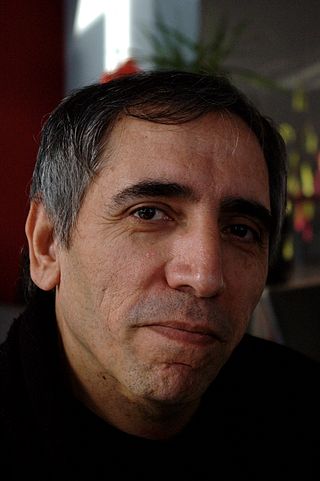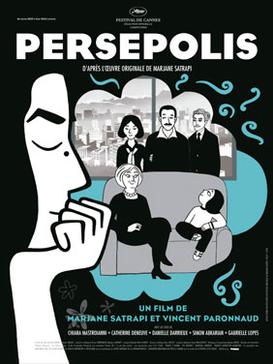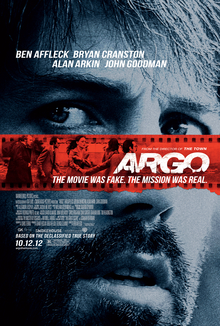| Cinema of Iran |
|---|
 |
| List of Iranian films |
| Pre 1960 |
| 1960s |
| 1970s |
| 1980s |
| 1990s |
| 2000s |
| 2010s |
| 2020s |
A list of films produced in Iran ordered by year of release in the 1960s. For an alphabetical list of Iranian films see Category:Iranian films
| Cinema of Iran |
|---|
 |
| List of Iranian films |
| Pre 1960 |
| 1960s |
| 1970s |
| 1980s |
| 1990s |
| 2000s |
| 2010s |
| 2020s |
A list of films produced in Iran ordered by year of release in the 1960s. For an alphabetical list of Iranian films see Category:Iranian films
| Year | Title | Director | Actors | Genre | Notability |
|---|---|---|---|---|---|
| 1960 | |||||
| 1961 | Fire and Ashes | ||||
| 1962 | The House is Black | Foroogh Farrokhzad | short documentary | A look at life and suffering in a leper colony | |
| 1963 | |||||
| 1964 | |||||
| 1965 | Ganj-e Qarun | Siamak Yasemi | Fardin | ||
| Adobe and Mirror | |||||
| Shabe Quzi | |||||
| The Bride of The Sea | |||||
| 1966 | |||||
| 1967 | The Night it Rained | ||||
| 1968 | The King of Hearts | ||||
| Yousaf Va Zulaykha / Yusuf İle Züleyha | Cüneyt Arkın, Forouzan | Pars Film, Erler Film | Iranian-Turkish co-production film | ||
| 1969 | Gaav | Dariush Mehrjui | Ezzatollah Entezami | Drama | Considered as the beginning of Iranian New Wave |
| Qeysar | Masoud Kimiai | Behrooz Vossoughi | Crime/Drama | ||
| The Cow | |||||
| Donyaye por Omid | |||||
| Heaven is Never a Great Distance | |||||

Iran, officially the Islamic Republic of Iran (IRI), also known as Persia, is a country in West Asia. It borders Turkey to the northwest and Iraq to the west, Azerbaijan, Armenia, the Caspian Sea, and Turkmenistan to the north, Afghanistan to the east, Pakistan to the southeast, the Gulf of Oman and the Persian Gulf to the south. With a multi-ethnic population of almost 90 million in an area of 1,648,195 km2 (636,372 sq mi), Iran ranks 17th globally in both geographic size and population. It is the sixth-largest country entirely in Asia and one of the world's most mountainous countries. Officially an Islamic republic, Iran has a Muslim-majority population. The country is divided into five regions with 31 provinces. Tehran is the nation's capital, largest city and financial center.

Abbas Kiarostami was an Iranian film director, screenwriter, poet, photographer, and film producer. An active filmmaker from 1970, Kiarostami had been involved in the production of over forty films, including shorts and documentaries. Kiarostami attained critical acclaim for directing the Koker trilogy (1987–1994), Close-Up (1990), The Wind Will Carry Us (1999), and Taste of Cherry (1997), which was awarded the Palme d'Or at the Cannes Film Festival that year. In later works, Certified Copy (2010) and Like Someone in Love (2012), he filmed for the first time outside Iran: in Italy and Japan, respectively. His films Where Is the Friend's Home? (1987), Close-Up, and The Wind Will Carry Us were ranked among the 100 best foreign films in a 2018 critics' poll by BBC Culture. Close-Up was also ranked one of the 50 greatest movies of all time in the famous decennial Sight & Sound poll conducted in 2012.

Mohsen Makhmalbaf is an Iranian film director, writer, film editor, and producer. He has made over 20 feature films, won 50 awards, and been a juror in more than 15 major film festivals. His award-winning films include Kandahar; his latest documentary is The Gardener and latest feature The President.

Shohreh Aghdashloo is an Iranian and American actress. She has received various accolades, including a Primetime Emmy Award and a Satellite Award, in addition to a nomination for an Academy Award.

The Islamic Republic of Iran Broadcasting or Seda va Sima for short, formerly called National Iranian Radio and Television until the Iranian revolution of 1979, is an Iranian state-controlled media corporation that holds a monopoly of domestic radio and television services in Iran. It is also among the largest media organizations in Asia and the Pacific region and a regular member of the Asia-Pacific Broadcasting Union. Its head is appointed directly by the Supreme Leader, Ayatollah Ali Khamenei.

The cinema of Iran, or of Persia, refers to the film industry in Iran. In particular, Iranian art films have garnered international recognition. Iranian films are usually written and spoken in the Persian language.

Jafar Panâhi is an Iranian film director, screenwriter, and film editor, commonly associated with the Iranian New Wave film movement. After several years of making short films and working as an assistant director for fellow Iranian filmmaker Abbas Kiarostami, Panahi achieved international recognition with his feature film debut, The White Balloon (1995). The film won the Caméra d'Or at the 1995 Cannes Film Festival, the first major award an Iranian film won at Cannes.

300 is a 2006 American epic historical action film directed by Zack Snyder, who co-wrote the screenplay with Kurt Johnstad and Michael B. Gordon, based on the 1998 comic book limited series of the same name by Frank Miller and Lynn Varley. The film, like its source material, is a fictionalized retelling of the Battle of Thermopylae in the Greco-Persian Wars. The plot revolves around King Leonidas, who leads 300 Spartans into battle against the Persian "God-King" Xerxes and his invading army of more than 300,000 soldiers. As the battle rages, Queen Gorgo attempts to rally support in Sparta for her husband. The film also features Michael Fassbender in his film debut.

Iran's annual Fajr International Film Festival, or Fajr Film Festival, has been held every February in Tehran since 1983. The festival is supervised by the Ministry of Culture and Islamic Guidance. It takes place on the anniversary of the 1979 Islamic Revolution. The awards are the Iranian equivalent to the American Academy Awards.

The White Balloon is a 1995 Iranian film directed by Jafar Panahi, with a screenplay by Abbas Kiarostami. It was Panahi's feature-film debut as director. The film received many strong critical reviews and won numerous awards in the international film fairs around the world including the Prix de la Camera d'Or at the 1995 Cannes Film Festival. The Guardian has listed this film as one of the 50 best family films of all time. The film is on the BFI list of the 50 films you should see by the age of 14.

Asghar Farhadi is an Iranian film director and screenwriter. He is considered one of the most prominent filmmakers of Iranian cinema as well as world cinema in the 21st century. His films have gained recognition for their focus on the human condition, and portrayals of intimate and challenging stories of internal family conflicts. In 2012, he was included on the annual Time 100 list of the most influential people in the world. That same year, he also received the Legion of Honour from France.

Zahra Amir Ebrahimi, known professionally as Zar Amir Ebrahimi, is an Iranian-French actress, producer and director. She rose to international prominence for her performance as journalist Arezoo Rahimi in the crime thriller Holy Spider (2022), for which she won the Cannes Film Festival Award for Best Actress and Robert Award for Best Actress.
A list of films produced in Iran ordered by year of release. For an alphabetical list of Iranian films see Category:Iranian films.

Persepolis is a 2007 adult animated biographical drama film written and directed by Marjane Satrapi and Vincent Paronnaud, based on Satrapi's autobiographical graphic novel of the same name. The story follows a young girl as she comes of age against the backdrop of the Iranian Revolution. The title references the historical city of Persepolis.

Pourān Derakh'shandeh is an Iranian film director, producer, screen writer, and researcher.

A Separation is a 2011 Iranian drama film written and directed by Asghar Farhadi, starring Leila Hatami, Peyman Moaadi, Shahab Hosseini, Sareh Bayat, and Sarina Farhadi. It focuses on an Iranian middle-class couple who separate, the disappointment and desperation suffered by their daughter due to the egotistical disputes and separation of her parents, and the conflicts that arise when the husband hires a lower-class caregiver for his elderly father, who suffers from Alzheimer's disease.

Argo is a 2012 American biographical historical drama thriller film directed, produced by, and starring Ben Affleck. The screenplay, written by Chris Terrio, was adapted from the 1999 memoir The Master of Disguise by U.S. C.I.A. operative Tony Mendez and the 2007 Wired article "The Great Escape: How the CIA Used a Fake Sci-Fi Flick to Rescue Americans from Tehran" written by Joshuah Bearman and edited by Nicholas Thompson. The film deals with the "Canadian Caper", in which Mendez led the rescue of six U.S. diplomats from Tehran, Iran, under the guise of filming a science-fiction film during the 1979–1981 Iran hostage crisis.